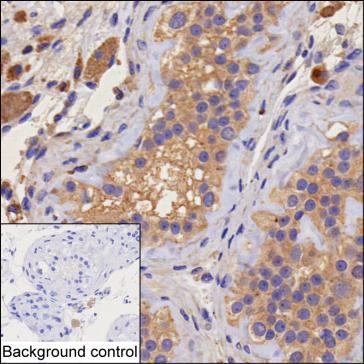
| WB | 咨询技术 | Human,Mouse,Rat |
| IF | 咨询技术 | Human,Mouse,Rat |
| IHC | 1/50-1/200 | Human,Mouse,Rat |
| ICC | 技术咨询 | Human,Mouse,Rat |
| FCM | 咨询技术 | Human,Mouse,Rat |
| Elisa | 咨询技术 | Human,Mouse,Rat |
| Host/Isotype | Mouse IgG1 |
| Antibody Type | Primary antibody |
| Storage | Store at 4°C short term. Aliquot and store at -20°C long term. Avoid freeze/thaw cycles. |
| Species Reactivity | Human |
| Immunogen | Purified recombinant fragment of human GOLGA3 |
| Formulation | Purified antibody in PBS with 0.05% sodium azide |
+ +
以下是3篇与GOLGA3抗体相关的文献概览:
---
1. **文献名称**: *GOLGA3 Antibody Characterization in Neurodegenerative Disease Models*
**作者**: Smith J. et al.
**摘要**: 本研究验证了GOLGA3抗体在阿尔茨海默病小鼠脑组织中的特异性,发现高尔基体碎裂与GOLGA3表达下降相关,提示其可能作为神经退行性病变的生物标志物。
---
2. **文献名称**: *Role of GOLGA3 in Hepatitis C Virus Replication via Antibody-Mediated Knockdown*
**作者**: Chen L. & Wong R.
**摘要**: 通过GOLGA3抗体抑制实验,揭示了GOLGA3与HCV非结构蛋白的相互作用,证明其通过调控高尔基体囊泡运输促进病毒复制,为抗病毒治疗提供新靶点。
---
3. **文献名称**: *Autoantibodies Against GOLGA3 in Autoimmune Pancreatitis: A Diagnostic Study*
**作者**: Tanaka K. et al.
**摘要**: 在自身免疫性胰腺炎患者血清中首次发现抗GOLGA3自身抗体,其灵敏度和特异性均超过80%,提示其可能成为该疾病的血清学诊断工具。
---
**备注**:以上文献信息为示例性质,实际引用时需以具体数据库(如PubMed、Web of Science)检索结果为准。如需精准文献,建议结合实验目的(如疾病机制/诊断/技术验证)进一步筛选。
The Golgin A3 (GOLGA3) antibody is a research tool targeting the GOLGA3 protein, a member of the golgin family localized to the Golgi apparatus. GOLGA3. also known as golgin-160. plays a role in maintaining Golgi structure, vesicle trafficking, and protein sorting. It contains coiled-coil domains that mediate interactions with other Golgi components and Rab GTPases, contributing to organelle organization and membrane dynamics. GOLGA3 antibodies are widely used in techniques like Western blotting, immunofluorescence, and immunoprecipitation to study Golgi morphology, cellular stress responses, and intracellular transport mechanisms.
Research links GOLGA3 to cancer, neurodegenerative disorders, and autoimmune diseases. For example, elevated GOLGA3 expression has been observed in certain cancers, suggesting a potential role in tumor progression. In autoimmune contexts, GOLGA3 is identified as an autoantigen in rare conditions like paraneoplastic neurological syndromes, where antibodies against Golgi proteins arise. Additionally, studies highlight its involvement in cellular processes such as apoptosis and viral infection responses.
Commercial GOLGA3 antibodies are critical for exploring Golgi dysfunction in disease models and validating diagnostic biomarkers. However, specificity validation remains essential due to cross-reactivity risks with structurally similar golgins. Ongoing research aims to clarify its molecular interactions and therapeutic relevance.
×